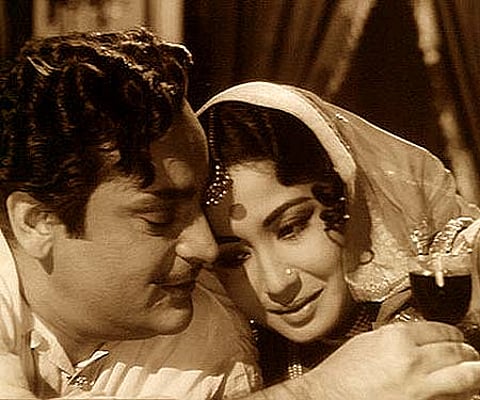

Chhoti Ammi. That’s the term of endearment Tajdar Amrohi was accorded when he was first introduced to his father’s new bride. “I was scared of her at first. She hugged me tightly but I shut my eyes. She told me, ‘Open your eyes. I am your chhoti ammi,’” says Tajdar, referring to his step-mother, screen tragedienne Meena Kumari who married his father, the late filmmaker Kamal Amrohi, when she was only 19 and he, 34.
Their marriage itself was rather impetuous although it followed, as the rule goes, a brief spell of romance conducted in full knowledge of both families involved. Tajdar recollects, over a cup of tea at his Bandra home, that Meena one evening knocked at their door and said, “I have left my home and I am going to stay here.” Just to be sure Amrohi asked her again if she was planning to go back home and when she reiterated a firm ‘no’, he proposed marriage.
“The nikaah took place the same day,” recalls Tajdar, adding, “But baba’s condition was that she would have to quit acting. But she was very ziddi; she told him either let her work or she will divorce him. Baba was never happy about her taking up films.”
As it turned out, Meena’s career went upwards post marriage. “Chhoti ammi not only enjoyed great success, but also used her maturity as a married woman to add depth and dimension to her performances.” Her marital bliss, however, proved to be short-lived. Soon thereafter, Amrohi and Meena saw their marriage disintegrating.
“They were both big personalities and their ego wouldn’t allow them to live together like a normal couple.” Also, says Tajdar, the coterie around Meena “poisoned” her against his father. But he insists they never divorced each other, as popularly perceived. “They were separated but despite that, they would talk to each other and still loved each other very much.”
Meena left Amrohi and moved, first to Paradise where her brother-in-law Mehmood had made arrangements for her and then, to Janki Kutir, Juhu. Her troubled personal life was compounded by chronic alcoholism and she had to find solace in poetry (sample this: Raha yuheen na muqammal mere ishq ka fasana/kabhi mujhko neend aayi kabhi so gaya zamana). To improve her English, she took to reading Agatha Christie’s crime novels with a bowl of mogra meshed in fresh water always by her bedside for fragrance.
Tajdar says the separation couldn’t have come at a worse time. “I was in my final year at Colonel Brown Cambridge School in Dehradun and it was beyond my comprehension why something like this happened at all. I was very disturbed.”
Subsequently, he came back to Mumbai and then left for Pune to receive college education. “Frankly, I wanted to go far away. I knew if I studied in Bombay I would have run into chhoti ammi. I had started hating her — but only superficially.” This was the time when Pakeezah, the epic on which Amrohi had bet his entire fortune, was stuck due to Meena’s strained relationship with him.
Tajdar says he was instrumental in breaking the ice between them, something that led directly to Meena resuming shooting of 'Pakeezah'.
“During my holidays, I would be in Bombay and I used to attend our office at Kamal Studios (presently, Natraj Studios, Andheri East). There was a phone call one day and chhoti ammi’s sister Shama aunty was on line. She told me that Manju (Meena’s pet name) is unwell and that I must visit her.” When Tajdar went to her place, they hugged and she wept in his arms. “When I looked at the watch it was 3 am. I told her I must go. She came to drop me home. Baba, who was living the life of a bachelor, was playing cards. Things started to smoothen up after that.”
Meena passed away within two months of 'Pakeezah’s release in 1972 and in her untimely death, at 39, the film went on to become an even bigger blockbuster. She was buried in Mazgaon, Mumbai, and Amrohi was interred at the same cemetery, in 1993, within a distance of “hardly one feet”.
“There were a lot of allegations against baba — that he never loved her, that he was jealous of her and that he used to send his secretary to spy on her,” he says. “All I know is that they could never be separated even in death. People can say whatever they want. Baba never cared.”